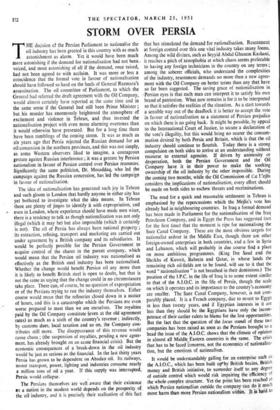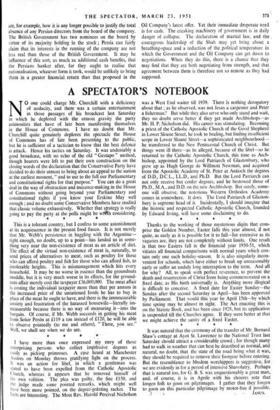STORM OVER PERSIA -
THE decision of the Persian Parliament to nationalise the oil industry has been greeted in this country with as much astonishment as alarm. Yet it would have been much more astonishing if the demand for nationalisation had not been voiced, and most astonishing of all if the demand, once raised, had not been agreed to with acclaim. It was more or less a coincidence that the formal vote in favour of nationalisation should have followed so hard on the heels of General Razmara's assassination. The oil committee of Parliament, to which the General had referred the draft agreement with the Oil Company, would almost certainly have reported at the same time and in the same sense if the General had still been Prime Minister ; but his murder has enormously heightened the atmosphere of excitement and violence in Tehran, and thus invested the nationalisation project with even more alarming overtones than it would otherwise have presented. But for a long time there have been rumblings of the coming storm. It was as much as six years ago that Persia rejected the Russian demand for an oil concession in the northern provinces, and this was not simply, as some Western observers liked to imagine, a courageous gesture against Russian interference ; it was a gesture by Persian nationalism in favour of Persian control over Persian resources. Significantly the same politician, Dr. Mosaddaq, who led the campaign against the Russian concession, has led the campaign in favour of nationalisation.
The idea of nationalisation has generated such joy in Tehran and such gloom in London that hardly anyone in either city has yet bothered to investigate what the idea means. In Tehran there are plenty of jingos to identify it with expropriation, and even in London, where experience should have made men wiser, there is a tendency to talk as though nationalisation was not only illegal (which it may be) but also impossible (which it certainly is not). The oil of Persia has always been national property ; its extraction, refining, transport and marketing are carried out under agreement by a British company and its subsidiaries. It would be perfectly possible for the Persian Government to acquire control of the shares in the parent company, which would mean that the Persian oil industry was nationalised as effectively as the British steel industry has been nationalised. Whether the change would benefit Persian oil any more than it is likely to benefit British steel is open to doubt, but that is not the same as saying that the change could in no circumstances take place. There can, of course, be no question of expropriation or of the Persians trying to run the industry themselves. Either course would mean that the refineries closed down in a matter of hours, and this is a catastrophe which the Persians are even worse prepared to meet than we are ourselves. The royalties paid by the Oil Company constitute (even at the old agreement rates) as much as a sixth of the country's revenue ; indirectly, by customs dues, local taxation and so on, the Company con- tributes still more. The disappearance of this revenue would cause chaos ; (the suspension of royalties, pending a new agree- ment, has already brought on an acute financial crisis). But the economic consequences of a break-down in the oil industry would be just as serious as the financial. In the last thirty years Persia has grown to be dependent on Abadan oil. Its railways, motor transport, power, lighting and industries consume nearly a million tons of oil a year. If this supply was interrupted, Persia would collapse.
The Persians themselves are well aware that their existence as a nation in the modern world depends on the prosperity of the oil industry, and it is precisely their realisation of this fact that has stimulated the demand for nationalisation. Resentment at foreign control over this one vital industry takes many forms. Among the wild divines, such as Seyyid Abdul Ghanem Kashani, it reaches a pitch of xenophobia at which chaos seems preferable to having any foreign technicians in the country on any terms ; among the soberer officials, who understand the complexities of the industry, resentment demands no more than a new agree- ment with the Oil Company on better terms than any that have so far been suggested. The saving grace of nationalisation in • Persian eyes is that each man can interpret it to satisfy his own brand of patriotism. What now remains is for it to be interpreted so that it satisfies the realities of the situation. As a start towards a sensible way out of the deadlock it is better to accept the vote in favour of nationalisation as a statement of Persian prejudice on which there is no going back. It might be possible, by appeal to the International Court of Justice, to secure a declaration of the vote's illegality, but this would bring no nearer the consum- mation desired by both Persia and Britain, which is that the oil industry should continue to flourish. Today there is a strong compulsion on both sides to arrive at an understanding without recourse to external agencies. If driven by animosity or desperation, both the Persian Government and the Oil Company have it in their power to make the working ownership of the oil industry by the other impossible. During the coming two months, while the Oil Commission of C.:e rejlis considers the implications of nationalisation, every effort should be made on both sides to eschew threats and recriminations.
The need for a quick and reasonable settlement in Tehran is emphasised by the repercussions which the Mejlis's vote has already had in neighbouring countries. In Iraq a formal demand has been made in Parliament for the nationalisation of the Iraq Petroleum Company, and in Egypt the Press has suggested (not for the first time) that the moment is ripe for nationalising the Suez Canal Company. These are the most obvious targets for nationalist ardour in the Middle East, though. there are other foreign-owned enterprises in both countries, and a few in Syria and Lebanon, which will probably in due course find a place on more ambitious programmes. (King Ibn Saud and the Sheikhs of Kuweit, Bahrein and Qatar, in whose lands the remaining rich oil-fields are to be found, will see to it that the word " nationalisation " is not breathed in their dominions.) The position of the I.P.C. in the life of Iraq is to some extent similar to that of the A.I.O.C. in the life of Persia, though the scale on which it operates and its importance to the country's economy are smaller. The Suez Canal Company, however, is not com- parably placed. It is a French company, due to revert to Egypt in less than twenty years, and if Egyptian interests in it arc less than they should be the Egyptians have only the incom- petence of their earlier rulers to blame for the lost opportunities. But the fact that the question of the locus standi of these two companies has been raised as soon as the Persians brought to a head the issue of the A.I.O.C. shows that the climate of opinion in almost all Middle Eastern countries is the same. The crisis that has to be faced 'Concerns, not the economics of nationalisa- tion, but the emotions of nationalism.
It would be understandably galling for an enterprise such as the A.I.O.C., which has been built up`by British brains, British money and British initiative, to surrender itself to any degree of outside control which would risk impairing the efficiency of the whole complex structure. Yet the point has been reached at which Persian nationalism outside the company can do it much more harm than more Persian nationalism within. It is hard to see, for example, how it is any longer possible to justify the total absence of any Persian directors from the board of the company. The British Government has two nominees on the board by virtue of its majority holding in the stock ; Persia can fairly claim that its interests in the running of the company are not less real than those of the British Government. It may be influence of this sort, as much as additional cash benefits, that the Persians hanker after, for they ought to realise that nationalisation, whatever form it took, would be unlikely to bring them in a greater financial return than that proposed in the Oil Company's latest offer. Yet their immediate desperate need is for cash. The creaking machinery of government is in daily danger of collapse. The declaration of martial law, and the courageous leadership of the Shah may yet bring about a breathing-space and a reduction of the political temperature in which the Government and the Oil Company can get down to negotiations. When they do this, there is a chance that they may find that they are both negotiating from strength, and that agreement between them is therefore not so remote as they had supposed.



































 Previous page
Previous page